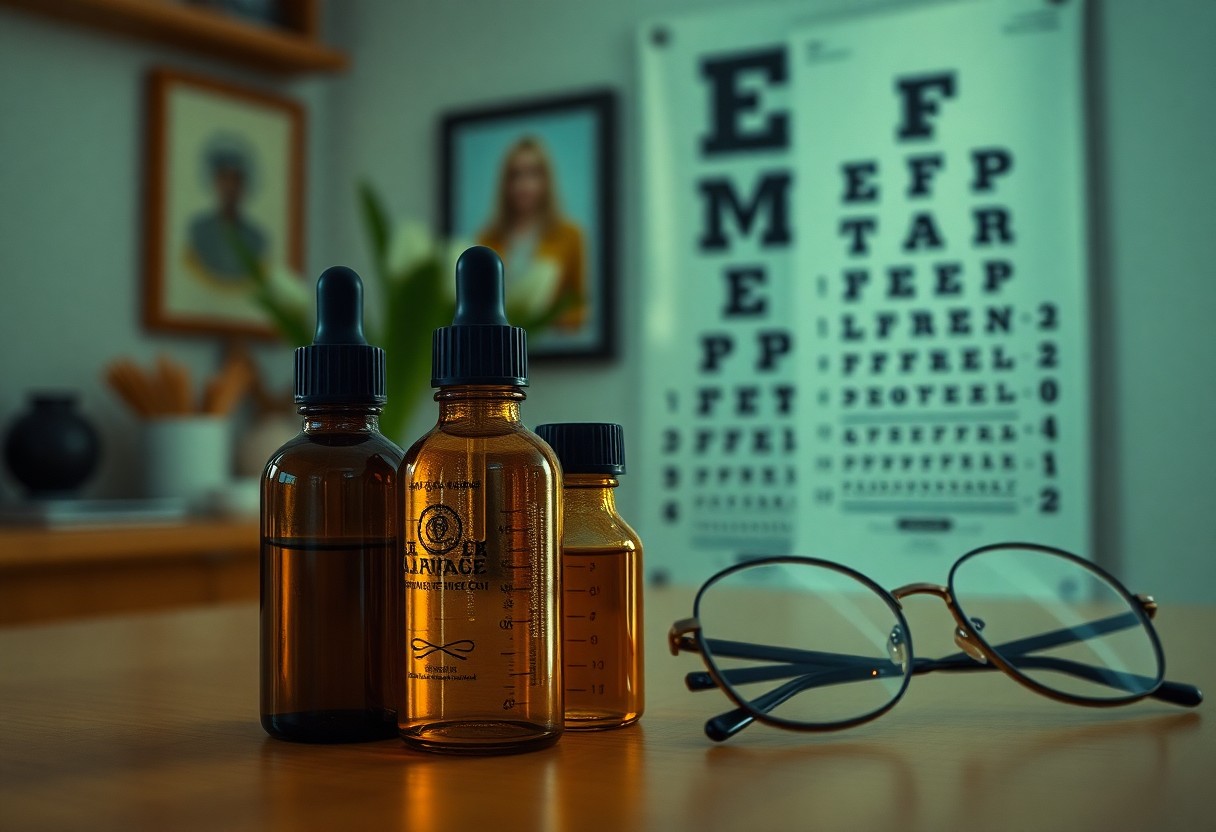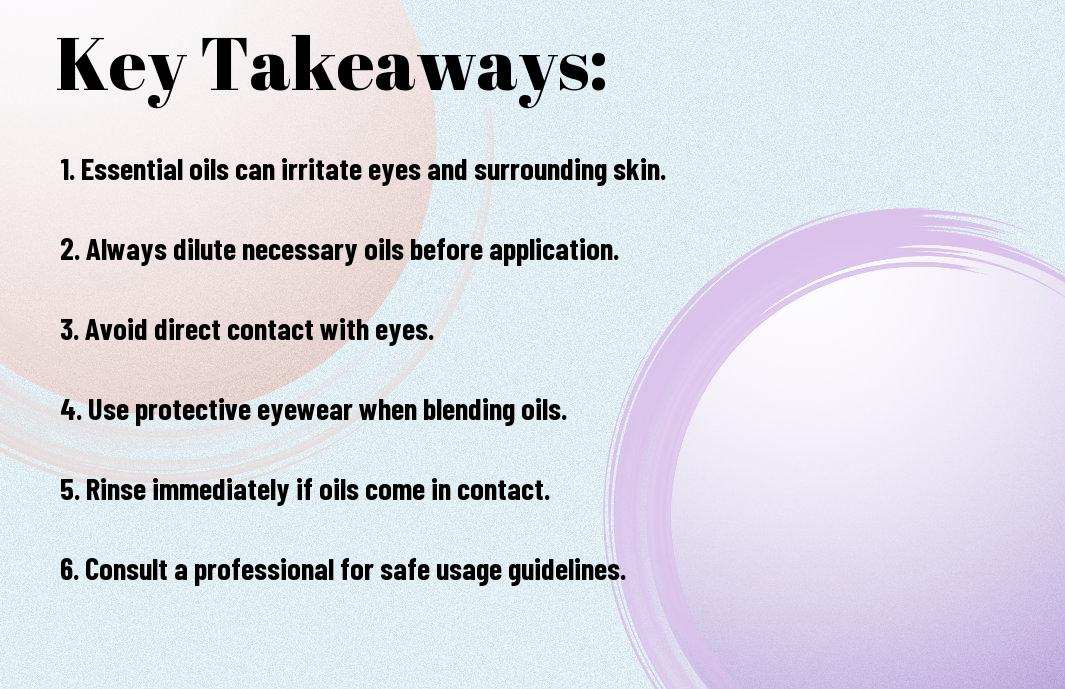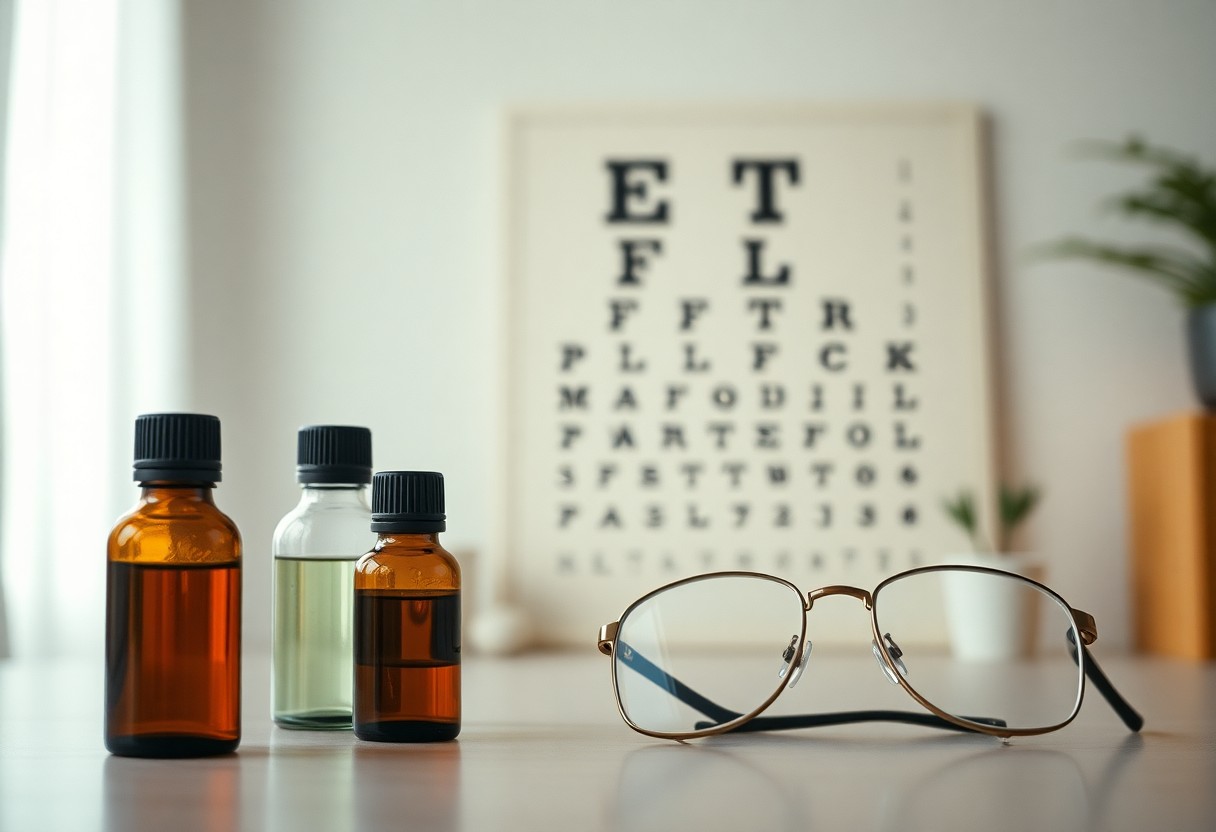Just because imperative oils are popular for their benefits doesn’t mean they come without risks. You may be surprised to learn that some oils can seriously harm your eyes if improperly used. Understanding which imperative oils pose a threat and how to protect your vision is imperative for safe usage. In this post, we’ll explore the potential dangers of imperative oils to your eyes and provide important safety tips to ensure you can enjoy their benefits without jeopardizing your eye health.

Key Takeaways:
- Essential oils can pose risks to eye health if they come into direct contact with the eyes, potentially leading to irritation or damage.
- Proper dilution and application techniques are necessary for safe use, including avoiding sensitive areas like the eyes when using necessary oils.
- If necessary oils accidentally enter the eyes or cause discomfort, it’s important to rinse thoroughly with water and seek medical attention if necessary.
Understanding Essential Oils
Before submerging into the safety aspects of necessary oils, it’s important to grasp what they are and how they function. Essential oils are highly concentrated extracts derived from various parts of plants, including leaves, flowers, stems, and roots. These oils capture the plant’s natural fragrance and beneficial properties, making them popular for both therapeutic and aromatic uses.
What Are Essential Oils?
For those new to aromatherapy, necessary oils are volatile compounds found in plants that provide distinctive aromas and potential health benefits. They are usually obtained through distillation or cold pressing, resulting in potent liquids that can be used in various ways.
Common Uses and Applications
Essential oils are known for their diverse applications, ranging from aromatherapy to personal care products. Many people use necessary oils in diffusers to create a calming atmosphere, while others incorporate them into skincare. Additionally, necessary oils can be found in natural cleaning products due to their antimicrobial properties.
Uses of necessary oils extend beyond mere fragrance. They play a role in enhancing mood, promoting relaxation, and supporting mental clarity when inhaled or applied topically, often mixed with carrier oils. Some oils, such as lavender, are renowned for their stress-relieving properties, while others like tea tree oil showcase powerful antiseptic benefits. However, it’s necessary to approach them with caution, as improper use can lead to adverse reactions, particularly for your skin and eyes.

Potential Risks to the Eyes
Now, while crucial oils offer numerous benefits, they can also pose risks to your eyes. Direct contact or exposure can lead to irritation, burning sensations, or even severe damage in some cases. It’s vital to handle these oils carefully to minimize the risk of accidents or adverse reactions that could affect your vision and overall eye health.
Chemical Composition of Essential Oils
One factor to consider is the chemical composition of crucial oils. Many oils contain potent compounds that can be irritating or harmful upon contact with the sensitive tissues of the eyes. Ingredients such as phenols, aldehydes, and terpenes can provoke a range of undesirable reactions, emphasizing the need for caution when using crucial oils around your face or eye area.
Symptoms of Eye Irritation
Chemical exposure to crucial oils in your eyes may lead to various symptoms of irritation. You might experience redness, watering, burning sensations, or even temporary blurry vision. Immediate attention is crucial if you encounter these symptoms, as they can quickly escalate into more serious issues if not addressed properly.
Another important detail to consider is that prolonged or severe irritation may lead to complications such as conjunctivitis or corneal damage. If you experience persistent symptoms like extreme redness, swelling, or changes in your vision, it’s critical to seek medical attention immediately. Protecting your eyes from crucial oils is crucial to maintaining your eye health and overall well-being.
Safe Handling Practices
Once again, prioritizing safety is important when using important oils. Always use proper handling techniques to avoid accidents and ensure that you maintain the full benefits of these potent substances. When working with important oils, use appropriate tools, such as droppers or glass bottles, and avoid direct contact with your skin or eyes. Additionally, keep oils away from children’s reach and be cautious of any allergic reactions. Your awareness of these practices can significantly reduce the risk of mishaps.
Dilution and Application Techniques
For effective use of important oils, always dilute them before applying them to your skin. Carrier oils, such as coconut or jojoba oil, can help soften the concentration of important oils, making them safer for application. When considering topical use, test a small area of your skin first for any adverse reactions. This step will ensure that you enjoy the benefits without compromising your safety.
Proper Storage Methods
Practices for storing important oils can significantly affect their longevity and potency. Aim to keep your oils in a cool, dark place, away from direct sunlight and heat sources. This helps prevent degradation and ensures that your oils remain safe for use. Additionally, always ensure that the caps are tightly sealed to avoid contamination and evaporation. Following these storage guidelines will protect your investment and maintain the integrity of your important oils.
At home, the best places to store your important oils are in a dark cabinet or a cool drawer to shield them from light. Exposure to high temperatures can lead to a loss of potency, while humidity can promote the growth of bacteria. Avoid storing your oils in the bathroom or kitchen, where temperature fluctuations are common. Finally, always label your important oils clearly; doing so not only helps you identify them easily but also ensures that you use them responsibly.

First Aid for Eye Exposure
Keep in mind that prompt action is crucial if crucial oils come into contact with your eyes. Quick and effective first aid can help minimize damage and alleviate discomfort. Whether it’s an accidental splash or inadvertent rubbing, knowing the first aid steps can significantly impact your recovery.
Immediate Steps to Take
With any eye exposure to crucial oils, your first move should be to rinse your eye with lukewarm water immediately. Use a gentle stream to flush out the irritant for at least 15 minutes. Avoid rubbing your eyes, as this can worsen irritation. If you wear contact lenses, remove them as soon as possible while continuing to rinse.
When to Seek Medical Attention
By observing your symptoms, you can determine whether you need professional care. If irritation persists after rinsing or you experience severe pain, redness, vision changes, or swelling, it’s vital to seek medical attention.
Medical professionals can provide you with treatments tailored to your specific situation. In the event of persistent symptoms, they might prescribe lubricating eye drops or other medications to relieve pain and irritation. If you encounter significant vision changes or heightened swelling, quick medical intervention is important to prevent further damage. Don’t underestimate the urgency; early treatment can make a significant difference in preserving your eye health.
Essential Oils to Avoid Near the Eyes
All crucial oils are not safe for use near your eyes. Certain oils pose a significant risk of irritation or damage if they come into contact with your eyes. To ensure your safety, it is important to identify and avoid these high-risk crucial oils when applying them in your beauty or wellness routines.
High-Risk Oils
Before you use crucial oils, be aware that some, like peppermint, eucalyptus, and clove, are high-risk. These oils can cause severe irritation, redness, or even injury if they accidentally enter your eyes. It’s best to avoid using these oils in areas close to your face to protect your eyes from potential harm.
Alternatives to Consider
Oils like lavender, chamomile, and geranium are safer alternatives to consider. If you are looking for soothing or aromatic options, these oils provide a more gentle approach and are less likely to cause irritation. Using quality, diluted versions in safe areas can enhance your experience while minimizing risks.
High-risk oils such as peppermint and eucalyptus can cause irritation and severe discomfort if they contact your eyes. Instead, opt for gentler alternatives like lavender and chamomile, which offer calming effects without significant risks. Always dilute crucial oils before use, particularly around sensitive areas, ensuring that you can reap the benefits without jeopardizing your eye health. Prioritize your safety by selecting suitable oils and applying them properly.
Conclusion
As a reminder, while imperative oils can offer numerous benefits, they also pose potential risks to your eyes if used improperly. Always ensure you handle these concentrated substances with care, avoiding direct contact with your eyes and using proper dilutions. If exposure occurs, seek immediate medical assistance. By following safety tips and remaining informed, you can enjoy the advantages of imperative oils while protecting your eye health effectively.
FAQ
Q: Can crucial oils cause damage to my eyes?
A: Yes, crucial oils can potentially cause irritation or damage to your eyes due to their concentrated nature. When they come into contact with the eyes, they may result in symptoms such as burning, stinging, redness, or even temporary blurred vision. It’s important to keep crucial oils away from the eye area.
Q: What should I do if crucial oil gets into my eye?
A: If crucial oil accidentally gets into your eye, promptly rinse the affected area with clean water for at least 15 minutes. Avoid rubbing your eyes, as this can exacerbate irritation. If discomfort persists or if you notice any serious symptoms, seek medical attention immediately.
Q: Are there specific crucial oils that are more harmful to the eyes?
A: Yes, certain crucial oils such as peppermint, eucalyptus, and oregano are more likely to cause irritation due to their strong chemical components. It’s best to avoid using these oils near the eyes or on areas of skin close to the eyes, such as the forehead or temples. Always read the safety guidelines for each specific oil before use.
Q: How can I safely use crucial oils without risking eye damage?
A: To safely use crucial oils, always dilute them with a carrier oil before applying to the skin. Use caution when applying them near the face or eye area. Additionally, consider using diffusers to avoid direct exposure. Always conduct a patch test before widespread use and consult with a healthcare provider if you are unsure about their safety.
Q: Is it safe to use crucial oils in aromatherapy if I’m concerned about eye damage?
A: Yes, using crucial oils in a diffuser for aromatherapy is generally safe and does not pose a risk to your eyes, as long as the oils are not being applied directly to the face or being inhaled in concentrated amounts. Make sure to properly ventilate the area and follow recommended guidelines for blending and diffusion to enjoy their benefits safely.
